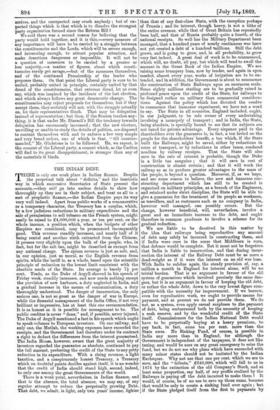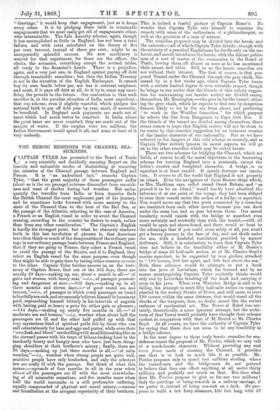THE INDIAN DEBT.
THERE is only one weak place in Indian finance. Despite the perpetual talk about " deficits," and the inartistic way in which successive Secretaries of State present the accounts,—they will go into useless details to show how thoroughly up 'they are in their subject, and treat us all to a sort of prophetic finance,---the Indian Empire pays its way very well indeed. Apart from public works of a remunerative or a temporary character, the Treasury has a surplus, which, by a few judicious reductions in military expenditure and the sale of permissions to sell tobacco on the French system, might easily be raised to £4,000,000 a year, or ten per cent. on the whole income, a position which, when the budgets of other Empires are considered, may be pronounced incomparably good. This revenue steadily increases, and nearly half of it being rental and another sixth extracted from the Chinese, it presses very slightly upon the bulk of the people, who, in fact, but for the salt tax, might be described as exempt from any national charge. The opium revenue is just as safe, and, in our opinion, just as moral, as the English revenue from spirits, while the tariff is, as a whole, based upon the scientific principle of redaction to the lowest limit consistent with the absolute needs of the State. Its average is barely 71 per cent. Trade, as the Duke of Argyll showed in his speech of Friday week, steadily increases, and now needs nothing except the provision of new harbours, a duty neglected in India, and a gradual increase in the means of communication, a duty thoroughly understood. The danger of insurrection, the only serious one, is not so great as the danger of war in Europe, while the financial management of the India Office, if not very brilliant or impressive, has at least this one recommendation. It is as honest as it is possible for management to be. The public creditor is never "done," and, if possible, never injured. The Duke of Argyll mentioned a fact in his speech which ought to speak volumes to European investors. On one railway, and only one, the Mutlah, the working expenses have exceeded the receipts, and the Government had therefore under its contract a right to deduct the differences from the interest guaranteed. The India House, however, aware that the great majority of investors regarded the guarantee as absolute, continued to pay the full amount, preferring the credit of the State to any petty reduction in its expenditure. With a rising revenue, a light taxation, and a conspicuously honest Treasury, a Treasury which on doubtful points decides against itself, it is no wonder that the credit of India should stand high, second, indeed, to only one among the great Governments of the world. There is a weak point, nevertheless, in Indian finance, and that is the absence, the total absence, we may say, of any regular attempt to reduce the perpetually growing Debt. That debt, we admit, is light, only two years' income, lighter than that of any first-class State, with the exception perhapa of Prussia ; and its interest, though heavy, is not a tithe of the entire revenue, while that of Great Britain has repeatedly been half, and that of Russia probably quite a fourth, of the national receipts. So well has the Military Department been managed, that a hundred years of nearly continuous war have not yet created a debt of a hundred millions. Still the debt grows, and is going to grow, and, in all probability, to grow very fast indeed. A great deal of work is to be commenced, which will, no doubt, all pay, but which will tend to swell the amount in the Great Book of the Indian Empire. We are raising some trumpery loan, now by tender, and again in open. market, almost every year, works of irrigation are to be ex- tended, and in addition, the Government is about to commence the construction of State Railways upon an enormous scale. Some eighty millions sterling are to be gradually raised in profound peace upon the credit of the State, for railways to be designed rather on military than commercial considera- tions. Against the policy which has dictated the resolve- to commence that immense experiment, we have not a word_ to say. The State in all countries, England included, ought, in our judgment, to be sole owner of every undertaking involving a monopoly of transport ; and in India, the State, being absolute, is specially bound to see that its subjects are. not taxed for private advantage. Every sixpence paid to the shareholders over the guarantee is, in fact, a tax levied on the people for the shareholders' benefit, a tax which, if the State- built the Railways, might be saved, either by reductions in rates of transport, or by reductions in other taxes, rendered needless by railway receipts. That the State will also- save in the rate of interest is probable, though the Duke is a little too sanguine ; that it will save in cost of- construction is almost certain ; and that it will work the railway so as to produce greater advantages to the mass of the people, is beyond a question. Moreover, if, as we hope, and see some reason to believe, the new and immense con- structing department which has still to be created is organized on military principles, as a branch of the Engineers,. and retained under strict discipline, the State will be able to give a guarantee for the treatment of its people as workmen, as travellers, and as customers such as no company in India, however well managed, can possibly secure. But the change, however beneficial, will, nevertheless, involve a. great and an immediate increase to the debt, and ought- therefore in common prudence to involve a scheme for its• gradual reduction. We are liable to be deceived in this matter by the idea that railways being reproductive any amount- of debt may safely be incurred in constructing them, and, if India were ours in the sense that Middlesex is outs, that defence would be complete. But it must not be forgotten. that India is liable to insurrection, and that during insur- rection the interest of the Railway Debt must be as mere a. dead-weight as if it were the interest on an old war loan. With India to subdue again, the steady provision of, say, a million a month in England for interest alone, will be ne. trivial burden. That is no argument in favour of the ell system of guarantees which involved precisely the same dan- gers, but it is an argument in favour of keeping the old debt, or rather the whole debt, down to the very lowest figure com- patible with the necessity for improvement. If we borroW, even for reproductive work, we ought to provide means for payment, and at present we do not provide them. We de not, as a system, even apply casual surpluses to the payment of debt, being embarrassed both by the necessity of keeping a cash reserve, and by the wonderful credit of the State- itself. Commissioners for the Indian National Debt would. have to be perpetually buying at a heavy premium, to- pay back, in fact, some ten per cent. more than the State owes. No Sinking Fund, of course, is possible in India any more than in England, for although the Government is independent of the taxpayers, it does not like taxing, and would be sure on any great emergency to seize the fund, but we do not see why plans which have succeeded with- many minor states should not be imitated by the Indian Exchequer. Why not use that one per cent. which we are to save, and the " tribute," £640,000, which will fall to us in 1874 by the extinction of the old Company's Stock, and at least some proportion, say half, of any profits realized by the Railways in paying off the debt incurred to make them ? It would, of course, be of no use to save up those sums, because that would be only to create a sinking fund over again ; but• if the State pledged itself from the first to payments by "drawings," it would keep that engagement, just as it keeps every other. It is by pledging State faith to terminable engagements that we most easily get rid of engagements other- wise interminable. The Life Annuity scheme, again, though it has accomplished so little in England, has not been a total failure, and with rates calculated on the theory of five per cent. interest, instead of three per cent., might be an unexpectedly splendid success. No new machinery is wanted for that experiment, for there are the offices, the clerks, the actuaries, everything except the revised tables, all ready to the financier's hands. There is a prejudice, again, and a very just one, in England against paying off debt through terminable annuities ; but then the Indian Treasury is not in the situation of the English Exchequer. It cannot buy its. own bonds below par, nor has it constant surpluses, and must, if it pays off debt at all, do it by in some way sacri- ficing the present to the future. Our contention is, that such sacrifice is, in the peculiar situation of India, most expedient ; that any scheme, even if slightly wasteful, which pledges the national faith to pay off debt year by year, must, of necessity, be beneficial. In England such payments are made out of taxes which had much better be remitted. In India, where the great taxes are never remitted, they are made out of the margin of waste. If the surplus were ten millions, the Indian Government would spend it all, and some at least of it very uselessly.































 Previous page
Previous page